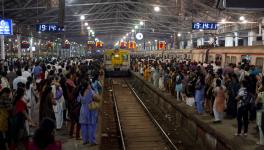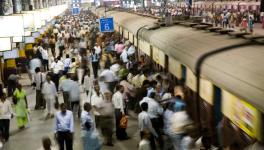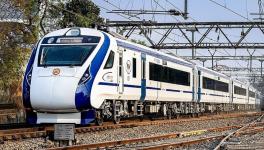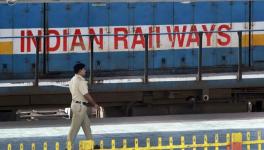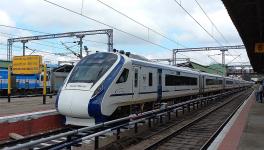Privatisation Move Gains Traction in Railways
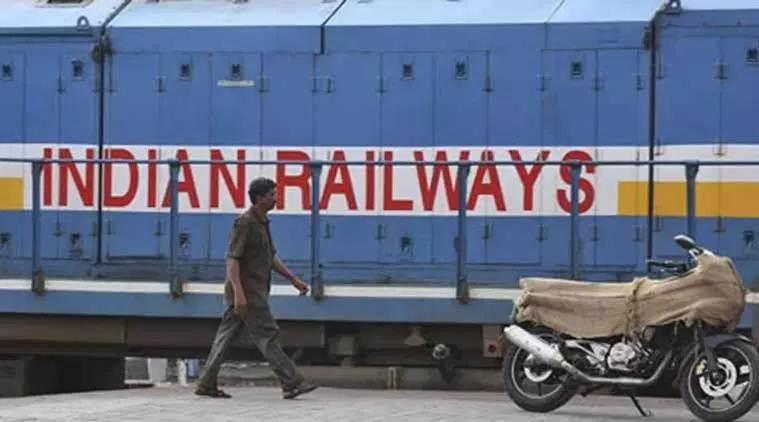
Image Courtesy: The Indian Express
With the growth rate dipping for five successive quarters, the Narendra Modi-led Bharatiya Janata Party government has embarked on an aggressive privatisation exercise and with that, Indian Railways is also set to initiate various measures, including divesting its stakes in rail PSUs, opening up to private players in freight and passenger operation, monetising its existing assets – mostly lands near stations – along with closing down many other premises like printing presses, which can be converted into real estate ventures.
The privatisation move has gained traction with Indian Railways allotting two routes – Mumbai-Ahmedabad and Delhi-Lucknow – to IRCTC for running trains on haulage charge basis and allowing the service provider to price it accordingly amid the mounting losses in passenger business. The Railways has already allowed private freight terminals and sidings on its premises for business houses. With this move on passenger segment, the cash-strapped public transporter is moving steadily towards privatisation by offloading many of its services in a phased manner.
Catering, on-board housekeeping service, maintenance of track and overhead electric equipment, sub-assembly of equipment required for rolling stock among others are currently outsourced to be managed privately.
Barring train operation and control including safety and track, sources maintain, gradually everything else will be in private hands.
Considered to be a pilot project for gauging the response to allowing private players to operate passenger train, Railways will decide on allotting about 25 more routes to interested parties connecting Patna, Kolkata, Mumbai, Chennai, Bangalore with capital as well as other major regional centres. Till now IRCTC, a railways subsidiary, was allowed to run luxury trains only for high-end tourists, like the Maharaja Express or Buddhist and Ramayan Specials.
However, though the Railways maintain that the train will be operated using the PPP (public-private partnership) model, there is no doubt that the move is a harbinger of private players’ entry in passenger business in a big way.
For Delhi-Lucknow and Mumbai-Ahmedabad sectors, where IRCTC will run Tejas Express, not only the passenger fares will be decided by the IRCTC, there will be a private train ticket examiner, exclusive catering, separate lounge and staff to manage the service. Except for driving, guarding, signalling and of course the track, all other functions will be privately managed. Till now, the amount of passenger fare was decided by Railways, but for these two trains, IRCTC will introduce dynamic fares competing with airfares.
With privatisation of Air India looming large, the state-run transporter is expediting its commercial exploitation of land, a major source for monetisation, in about 50 stations.
Indian Railway Stations Development Corporation Limited (IRSDC), which is the nodal agency for redevelopment of railway stations in India, plans to scale up the programme and will initially develop approximately 50 stations through public-private partnership.
As per IRSDC’s business model, station redevelopment is to be funded by commercial exploitation of air space above stations and adjoining railway land.
In order to earn revenue, Railways is inviting real estate players to redevelop about 400 major stations across the country allowing shopping malls, multiplexes, budget hotels, office complexes, global brand eateries and parking lots to be included in the redevelopment plan.
The Union Cabinet has allowed 99-year lease for developers to commercially exploit the railway land with a revenue sharing model in which selected bidders will provide improved passenger amenities at the rail premises.
The Modi 2.0 government has budgeted Rs 1.05 lakh crore from PSUs by reducing government stake to less than 51% in the state-run firms. The Cabinet Committee on Economic Affairs had already approved listing of five profit-making rail PSUs – Ircon International, Rail Vikas Nigam Limited, Indian Railway Finance Corporation, RITES Limited and IRCTC – with the aim of raising about Rs 10,000 crore from these units.
On the rail production unit front, the Railways has rolled out an action plan amid widespread protests from locals and workers involved in the factories for which a detailed study is underway to corporatise all the seven production units including the Rail Coach Factory at Kapurthala, Integral Coach Factory at Chennai, Modern Coach Factory at Rae Bareli. Its associated workshops are to be clubbed into a new entity called ‘Indian Railways Rolling Stock Company’ under the Railways Ministry.
The corporatisation move will begin with the newly set up Rae Bareli factory to be followed by all production units to be taken over in a phased manner.
Continuing on the private path, all railway printing presses are also going to be closed and handed over for commercial development despite opposition from the unions.
Recently, Railways has decided to allow private players to explore routes between World Heritage Sites like Shimla-Kalka, Darjeeling and Nilgiri Hill rail service using PPP model for commercial utilisation – without violating heritage values.
Also read: Indian Railways on the Fast Track to Total Privatisation
Get the latest reports & analysis with people's perspective on Protests, movements & deep analytical videos, discussions of the current affairs in your Telegram app. Subscribe to NewsClick's Telegram channel & get Real-Time updates on stories, as they get published on our website.










